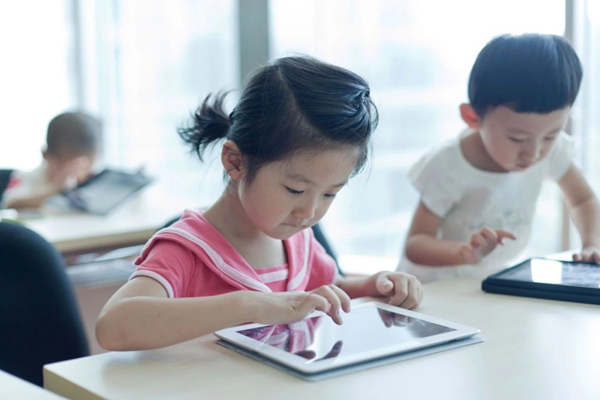家长们曾担心电视对孩子的影响,如今,随着电脑、手机、平板和电子游戏的泛滥,家长们又有了新的担忧:自家孩子花在屏幕设备上的时间总量。研究发现,过多的屏幕时间,可能影响幼儿的发育。

In news that will surprise few but still alarm many, a study has found that kids 2-5 years old who engage in more screen time received worse scores in developmental screening tests. The apparent explanation is simple: when a kid is in front of a screen, they're not talking, walking or playing, the activities during which basic skills are cultivated.
一个不怎么让人意外但仍值得警醒的消息是研究发现,2-5岁的孩子盯着屏幕的时间越长,在发育筛查测试中的得分越低。显而易见的是:当一个孩子盯着屏幕时,他们无法进行说话、走路、玩耍这些培养基本技能的活动。
The study, from the University of Calgary psychologists and published today in the JAMA journal Pediatrics, examined the effect of screen time during a developmental period on performance in basic skills at the end of each period - specifically, at 24, 36 and 60 months old. Caregivers reported average screen time, and also filled out standard questionnaires on motor and communication skills.
这项研究由卡尔加里大学心理学家进行,并于今天发表在《美国医学会杂志儿科学》上。这项研究考察了在每个发展阶段盯着屏幕的时间对基本技能表现的影响,特别是在24、36和60个月大的时候。护理人员报告了平均盯着屏幕的时间,并填写了关于运动和沟通技巧的标准问卷。
A rather straightforward correlation appeared in the results:
结果显示了一个相当直接的相关性:
Greater screen time at 24 months was associated with poorer performance on developmental screening tests at 36 months, and similarly, greater screen time at 36 months was associated with lower scores on developmental screening tests at 60 months.
24个月大时盯着屏幕的时间与36个月大时的发育筛查测试表现差有关,同样,36个月大时盯着屏幕的时间与60个月大时的发育筛查测试得分较低有关。
Importantly, the effect was not bidirectional or ambiguous - kids with more screen time usually had lower scores, but kids with lower scores didn't necessarily have more screen time. This strengthens the hypothesis that screen time leads to lower scores instead of an unknown variable or variables affecting both.
重要的是,这种影响不是双向的,也不是模棱两可的 - 盯着屏幕时间长的孩子通常得分较低,但分数较低的孩子不一定有更多的盯着屏幕的时间。这加强了这样一种假设,即盯着屏幕的时间导致了较低的分数,而不是一个未知的变量或影响两者的变量。
The exact mechanism can't be tested with the present data, but lead author Sheri Madigan suggests it isn't exactly mysterious:
目前的数据还无法验证这一机制的正确性,但研究报告的第一作者雪莉·马迪根认为,这并不神秘:
"A lot of the positive stimulation that helps kids with their physical and cognitive development comes from interactions with caregivers," she said in a University of Calgary news release. "When they're in front of their screens, these important parent-child interactions aren't happening."
她在卡尔加里大学的新闻发布会上说:"很多有助于孩子身体和认知发展的积极刺激,都来自于与看护者的互动。当他们在盯着屏幕时,这些重要的亲子互动没有办法进行。"
And not just those, either. The paper explains in a bit more detail:
不仅如此。论文更详细的解释如下:
When young children are observing screens, they may be missing important opportunities to practice and master interpersonal, motor, and communication skills. For example, when children are observing screens without an interactive or physical component, they are more sedentary and, therefore, not practicing gross motor skills, such as walking and running, which in turn may delay development in this area. Screens can also disrupt interactions with caregivers by limiting opportunities for verbal and nonverbal social exchanges, which are essential for fostering optimal growth and development.
当幼儿在盯着屏幕时,他们可能会错过练习和掌握人际关系、运动和沟通技巧的重要机会。例如,当儿童在观看没有互动的屏幕时,他们更喜欢久坐,因此没有办法练习运动技能,比如步行和跑步,这反过来可能会延缓这方面的发育。屏幕还会通过限制语言和非语言交流来干扰与看护人员的互动,而这对促进生长和发育至关重要。
It's hard to find a counter-argument to this. Screen time isn't just plain bad, and as many have pointed out its ubiquity precludes the possibility of avoidance. So the question is not "whether or not" but "how much?"
很难找到一个反驳的论点。盯着屏幕的时间不仅仅是一件坏事,正如许多人所指出的那样,它的普遍性排除了避免的可能性。所以问题不是"是否"而是"多少?"
And while there are arguments for dividing screen time into high and low quality, or beneficial and non-beneficial (these are not differentiated in the study), those are much more applicable for older children who are capable of engaging with it in more sophisticated ways. At very early ages it's hard to deny that a child's time is better spent on activities through which they advance their most basic skills.
虽然有人主张将对着屏幕的时间分为高质量和低质量,或有益和无益(这些在研究中没有区分),但这些更适用于能够通过更复杂的方式参与其中的稍大一点的儿童。无法否认,在孩子很小的时候,把时间花在能提高最基本技能的活动上更好。
For reference, the kids in the study were averaging 2-3 hours per day. But it's important to note that there isn't some magical number of hours that's okay or harmful - "Unfortunately, we can't derive this 'tipping point' from the statistical analyses that we provided," Madigan told me in an email. "It will be an important avenue of our future research."
作为参考,研究中的孩子平均每天有2-3小时的屏幕时间。但值得注意的是,并没有区分有益或无益的神奇小时数-"不幸的是,我们无法从我们提供的统计分析中得出这个'临界点',"马迪根在一封电子邮件中告诉我。"这将是我们未来研究的一个重要途径。"
So you need to hide all screens from your kids and worry like mad if they somehow manage to wheedle an extra half hour of Dora time out of you while you finish dinner. The implication isn't that screen time is inherently bad but that it risks replacing the "high quality caregiver-child interactions" that are so critical at this period of development. The solution therefore is not necessarily less screens, but more and better time spent with the kid.
所以你需要把孩子所有的屏幕都藏起来,并且疯了似的担心,如果他们在你吃完晚餐时设法从你身上骗取额外的半小时来观看《爱冒险的朵拉》。这并不是说盯着屏幕本身就不好,而是说它有可能取代"看护者和孩子之间高质量的互动",而这种互动在这个发展阶段非常关键。因此,解决的办法不一定是减少屏幕,而是花更多的时间和孩子在一起。
Giving parenting advice is well outside the scope of a tech blog, but as an uncle and generally speaking as a human, I think it's safe to say that there are great ways of integrating screen-based content with ordinary play, and in fact many companies are dedicated to that possibility.
提供育儿建议远远超出了科技博客的范围,但作为一个叔叔,我认为会有更好的方法将屏幕内容与普通游戏相结合起来,事实上很多公司都致力于这种可能性。
Playing a game ought not to adversely affect communication if it's a kid collaborating on a Minecraft base with their sibling, right? Or if a show is being watched in an active way that encourages communicating and trying new things? A parent will know best, but it's important to pay attention in the first place, and establishing causal connections like the one suggested in this study is one more reason to do so.
玩游戏或许不会对交流产生负面影响,如果是一个孩子与他的兄弟姐妹一起玩《我的世界》,对吧?或者以一种鼓励交流和尝试新事物的积极方式来观看节目?父母最好清楚,但首先要注意的是,建立像本研究中建议的那种因果关系,是这样做的另一个原因。
(责任编辑:周姚)

